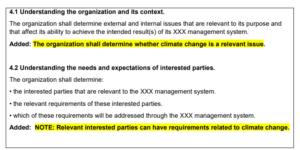New ISO Policy Change: significant addition of Climate Change to all management system standards
On 22 February 2024, the International Accreditation Forum (IAF) and the International Organisation for Standardisation (ISO) published a joint communiqué to highlight the upcoming publication of Climate Action Amendments to new and existing ISO management systems standards.
The International Accreditation Forum is a worldwide association of accreditation bodies and other bodies interested in conformity assessment in the fields of management systems, products, processes, services, personnel, validation and verification and other similar programmes of conformity assessment. The International Organisation for Standardisation is a global network that bring together experts to develop international standards such as ISO 9001, ISO 14001, ISO 45001 and ISO 50001.
All organisations certified to any ISO management system standard must now consider if Climate Change is a relevant issue within each management system. There are no actual documentary changes to any of the management system standards, but the proposed amendments take immediate effect and require immediate action by applicable organisations.
All management system standards are being updated by means of an amendment, which differs from the process which follows when a standard is revised. An amendment is a list of one or more changes to a standard; in this case, a single-page document describing what additional words have been added, and where they have been added. Amending a standard leaves the existing version of the standard in force but with these additions and is quite different from a revision, where the whole document is republished with changes incorporated into a new version that supersedes the previous revision of the standard.
ISO Clause Addition:
A key excerpt from the IAF/ISO joint communique is noteworthy.
“The overall intent of the requirements for clauses 4.1 and 4.2 remain unchanged; these clauses already include the need for the organisation to consider all internal and external issues that can impact the effectiveness of their management system; these new inclusions are assuring that Climate Change is considered within the management system and that it is an external factor that is important enough for our community to require organisations to consider it now.”
In essence what this means is that ISO-certified organisations must now ensure that they have considered Climate aspects and risks within the development, maintenance, and effectiveness of their own management system or systems.
Climate, along with other issues, should be determined as relevant or not and if so, considered as an integral part of the risk evaluation process, within the scope of the management systems standards. Where an organisation operates more than one management system (for example ISO 9001 and ISO 45001), it must ensure that Climate, if determined to be relevant, is considered within the scope of each management system standard.
Some climate aspects and risks may be of a general nature, independent of the applicable management system scope or the industry (e.g. when related to regulatory compliance or operational adaptability and organisational resilience), while others will be specifically indexed to the requirements of the management system standards, to specific industries (e.g. energy production, agriculture and fisheries) and to characteristics of the organisation (e.g. geographical location, nature of its supply-chain or workforce dynamics).
This means considering risks related to climate change itself, together with risks from actions related to climate adaptation and climate mitigation: For example:
- Risks related to climate itself might include extreme weather events disrupting supply chains or causing injury to workers.
- Actions associated with climate adaptation might include mountainous regions having to find ways to limit landslides, with an associated increase in OH&S risks.
- Actions associated with climate mitigation, such as the installation of on-site renewable energy generation, may introduce new risks – e.g. working at height or working in confined spaces risks where maintenance of the equipment is required.
By identifying relevant aspects of climate change as part of its “context”, the organisation should then take these aspects into account in its management system, by assessing the relevant risks and taking action to address them.
Certification bodies will, during their certification audits, assess if all relevant internal and external issues have been considered by the organisation in the development and effectiveness of its management system(s), as required by clause 4.1: Understanding the organisation and its context and clause 4.2: Understanding the needs and expectations of stakeholders.
Certification bodies will be looking for objective evidence that Climate has been considered by the organisation and if deemed to be relevant, that it is included in the organisation’s risk evaluation process. If Climate is not considered relevant by the organisation, the certification body will be looking for evidence that the organisation’s rationale for this determination is valid and effective.
It should be noted that issues relating to Climate affecting the context of the organisation’s management system(s) are typically already being considered by organisations.
References:
DNV Addition of Climate to ISO Standards



